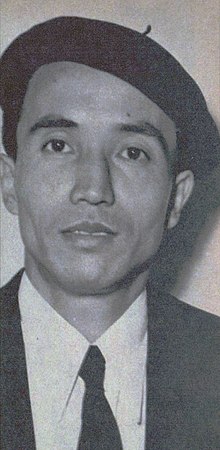Loading AI tools
From Wikipedia, the free encyclopedia
Noboru Nakamura (中村登, Nakamura Noboru, 4 August 1913 – 20 May 1981) was a Japanese film director and screenwriter.[1][2]
Noboru Nakamura | |
|---|---|
 | |
| Born | 4 August 1913 Negishi, Shitaya-ku, Tokyo |
| Died | 20 May 1981 (aged 67) |
| Occupation(s) | Film director, screenwriter |
After graduating from the Tokyo Imperial University Faculty of Letters in 1936, Nakamura joined the Shochiku film studios, working as an assistant director for Torajirō Saitō and Yasujirō Shimazu.[1][2] He debuted as director in 1941 with Life and Rhythm, and finally received recognition with his 1951 film Home Sweet Home.[1] His most noted works include the Yasunari Kawabata adaptation Twin Sisters of Kyoto (1963), The Kii River (1966) and Portrait of Chieko (1967).[1][2] Both Twin Sisters of Kyoto and Portrait of Chieko were nominated for the Academy Award for Best Foreign Language Film[3][4] Nakamura was posthumously awarded the Order of the Rising Sun, 4th class.[5]
To celebrate Nakamura's 100th birthday, three of his films, Home Sweet Home (1951), Doshaburi (1957) and The Shape of Night (1964), were screened at the Tokyo Filmex in 2013.[6][5] The Shape of Night was also shown at the Venice Film Festival the same year.[5] Home Sweet Home and Doshaburi were screened in the Forum section of the 2014 Berlin International Film Festival.[7][8]
Seamless Wikipedia browsing. On steroids.
Every time you click a link to Wikipedia, Wiktionary or Wikiquote in your browser's search results, it will show the modern Wikiwand interface.
Wikiwand extension is a five stars, simple, with minimum permission required to keep your browsing private, safe and transparent.